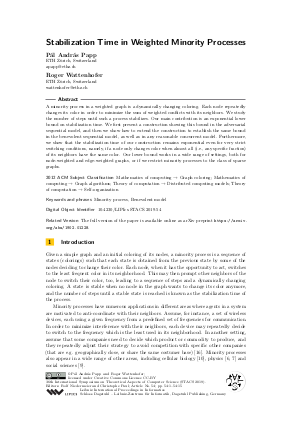Stabilization Time in Weighted Minority Processes
Authors Pál András Papp, Roger Wattenhofer
-
Part of:
Volume:
36th International Symposium on Theoretical Aspects of Computer Science (STACS 2019)
Part of: Series: Leibniz International Proceedings in Informatics (LIPIcs)
Part of: Conference: Symposium on Theoretical Aspects of Computer Science (STACS) - License:
 Creative Commons Attribution 3.0 Unported license
Creative Commons Attribution 3.0 Unported license
- Publication Date: 2019-03-12
File

PDF
LIPIcs.STACS.2019.54.pdf
- Filesize: 492 kB
- 15 pages
Document Identifiers
Related Versions
-
The full version of the paper is available online as arXiv preprint https://arxiv.org/abs/1902.01228.
Subject Classification
ACM Subject Classification
- Mathematics of computing → Graph coloring
- Mathematics of computing → Graph algorithms
- Theory of computation → Distributed computing models
- Theory of computation → Self-organization
Keywords
- Minority process
- Benevolent model
Metrics
- Access Statistics
-
Total Accesses (updated on a weekly basis)
0PDF Downloads0Metadata Views
Abstract
A minority process in a weighted graph is a dynamically changing coloring. Each node repeatedly changes its color in order to minimize the sum of weighted conflicts with its neighbors. We study the number of steps until such a process stabilizes. Our main contribution is an exponential lower bound on stabilization time. We first present a construction showing this bound in the adversarial sequential model, and then we show how to extend the construction to establish the same bound in the benevolent sequential model, as well as in any reasonable concurrent model. Furthermore, we show that the stabilization time of our construction remains exponential even for very strict switching conditions, namely, if a node only changes color when almost all (i.e., any specific fraction) of its neighbors have the same color. Our lower bound works in a wide range of settings, both for node-weighted and edge-weighted graphs, or if we restrict minority processes to the class of sparse graphs.
Cite As Get BibTex
Pál András Papp and Roger Wattenhofer. Stabilization Time in Weighted Minority Processes. In 36th International Symposium on Theoretical Aspects of Computer Science (STACS 2019). Leibniz International Proceedings in Informatics (LIPIcs), Volume 126, pp. 54:1-54:15, Schloss Dagstuhl – Leibniz-Zentrum für Informatik (2019)
https://doi.org/10.4230/LIPIcs.STACS.2019.54
BibTex
@InProceedings{papp_et_al:LIPIcs.STACS.2019.54,
author = {Papp, P\'{a}l Andr\'{a}s and Wattenhofer, Roger},
title = {{Stabilization Time in Weighted Minority Processes}},
booktitle = {36th International Symposium on Theoretical Aspects of Computer Science (STACS 2019)},
pages = {54:1--54:15},
series = {Leibniz International Proceedings in Informatics (LIPIcs)},
ISBN = {978-3-95977-100-9},
ISSN = {1868-8969},
year = {2019},
volume = {126},
editor = {Niedermeier, Rolf and Paul, Christophe},
publisher = {Schloss Dagstuhl -- Leibniz-Zentrum f{\"u}r Informatik},
address = {Dagstuhl, Germany},
URL = {https://drops.dagstuhl.de/entities/document/10.4230/LIPIcs.STACS.2019.54},
URN = {urn:nbn:de:0030-drops-102938},
doi = {10.4230/LIPIcs.STACS.2019.54},
annote = {Keywords: Minority process, Benevolent model}
}
Author Details
References
-
Ron Aharoni, Eric C Milner, and Karel Prikry. Unfriendly partitions of a graph. Journal of Combinatorial Theory, Series B, 50(1):1-10, 1990.

-
Cristina Bazgan, Zsolt Tuza, and Daniel Vanderpooten. On the existence and determination of satisfactory partitions in a graph. In International Symposium on Algorithms and Computation, pages 444-453. Springer, 2003.

-
Cristina Bazgan, Zsolt Tuza, and Daniel Vanderpooten. Complexity and approximation of satisfactory partition problems. In International Computing and Combinatorics Conference, pages 829-838. Springer, 2005.

-
Cristina Bazgan, Zsolt Tuza, and Daniel Vanderpooten. The satisfactory partition problem. Discrete applied mathematics, 154(8):1236-1245, 2006.

-
Cristina Bazgan, Zsolt Tuza, and Daniel Vanderpooten. Satisfactory graph partition, variants, and generalizations. European Journal of Operational Research, 206(2):271-280, 2010.

-
Olivier Bodini, Thomas Fernique, and Damien Regnault. Quasicrystallization by stochastic flips. HAL online archives, 2009.

-
Olivier Bodini, Thomas Fernique, and Damien Regnault. Stochastic flips on two-letter words. In 2010 Proceedings of the Seventh Workshop on Analytic Algorithmics and Combinatorics (ANALCO), pages 48-55. SIAM, 2010.

-
Henning Bruhn, Reinhard Diestel, Agelos Georgakopoulos, and Philipp Sprüssel. Every rayless graph has an unfriendly partition. Combinatorica, 30(5):521-532, 2010.

-
Zhigang Cao and Xiaoguang Yang. The fashion game: Network extension of matching pennies. Theoretical Computer Science, 540:169-181, 2014.

-
Jacques Demongeot, Julio Aracena, Florence Thuderoz, Thierry-Pascal Baum, and Olivier Cohen. Genetic regulation networks: circuits, regulons and attractors. Comptes Rendus Biologies, 326(2):171-188, 2003.

-
Silvio Frischknecht, Barbara Keller, and Roger Wattenhofer. Convergence in (social) influence networks. In International Symposium on Distributed Computing, pages 433-446. Springer, 2013.

-
Michael U Gerber and Daniel Kobler. Algorithmic approach to the satisfactory graph partitioning problem. European Journal of Operational Research, 125(2):283-291, 2000.

-
Michael U Gerber and Daniel Kobler. Classes of graphs that can be partitioned to satisfy all their vertices. Australasian Journal of Combinatorics, 29:201-214, 2004.

-
Sandra M Hedetniemi, Stephen T Hedetniemi, KE Kennedy, and Alice A Mcrae. Self-stabilizing algorithms for unfriendly partitions into two disjoint dominating sets. Parallel Processing Letters, 23(01):1350001, 2013.

-
Barbara Keller, David Peleg, and Roger Wattenhofer. How Even Tiny Influence Can Have a Big Impact! In International Conference on Fun with Algorithms, pages 252-263. Springer, 2014.

-
Jeremy Kun, Brian Powers, and Lev Reyzin. Anti-coordination games and stable graph colorings. In International Symposium on Algorithmic Game Theory, pages 122-133. Springer, 2013.

-
Damien Regnault, Nicolas Schabanel, and Éric Thierry. Progresses in the Analysis of Stochastic 2D Cellular Automata: A Study of Asynchronous 2D Minority. In Luděk Kučera and Antonín Kučera, editors, Mathematical Foundations of Computer Science 2007, pages 320-332. Springer Berlin Heidelberg, 2007.

-
Damien Regnault, Nicolas Schabanel, and Éric Thierry. On the analysis of “simple” 2d stochastic cellular automata. In International Conference on Language and Automata Theory and Applications, pages 452-463. Springer, 2008.

-
Jean-Baptiste Rouquier, Damien Regnault, and Éric Thierry. Stochastic minority on graphs. Theoretical Computer Science, 412(30):3947-3963, 2011.

-
Khurram H Shafique and Ronald D Dutton. On satisfactory partitioning of graphs. Congressus Numerantium, pages 183-194, 2002.

-
Saharon Shelah and Eric C Milner. Graphs with no unfriendly partitions. A tribute to Paul Erdös, pages 373-384, 1990.

